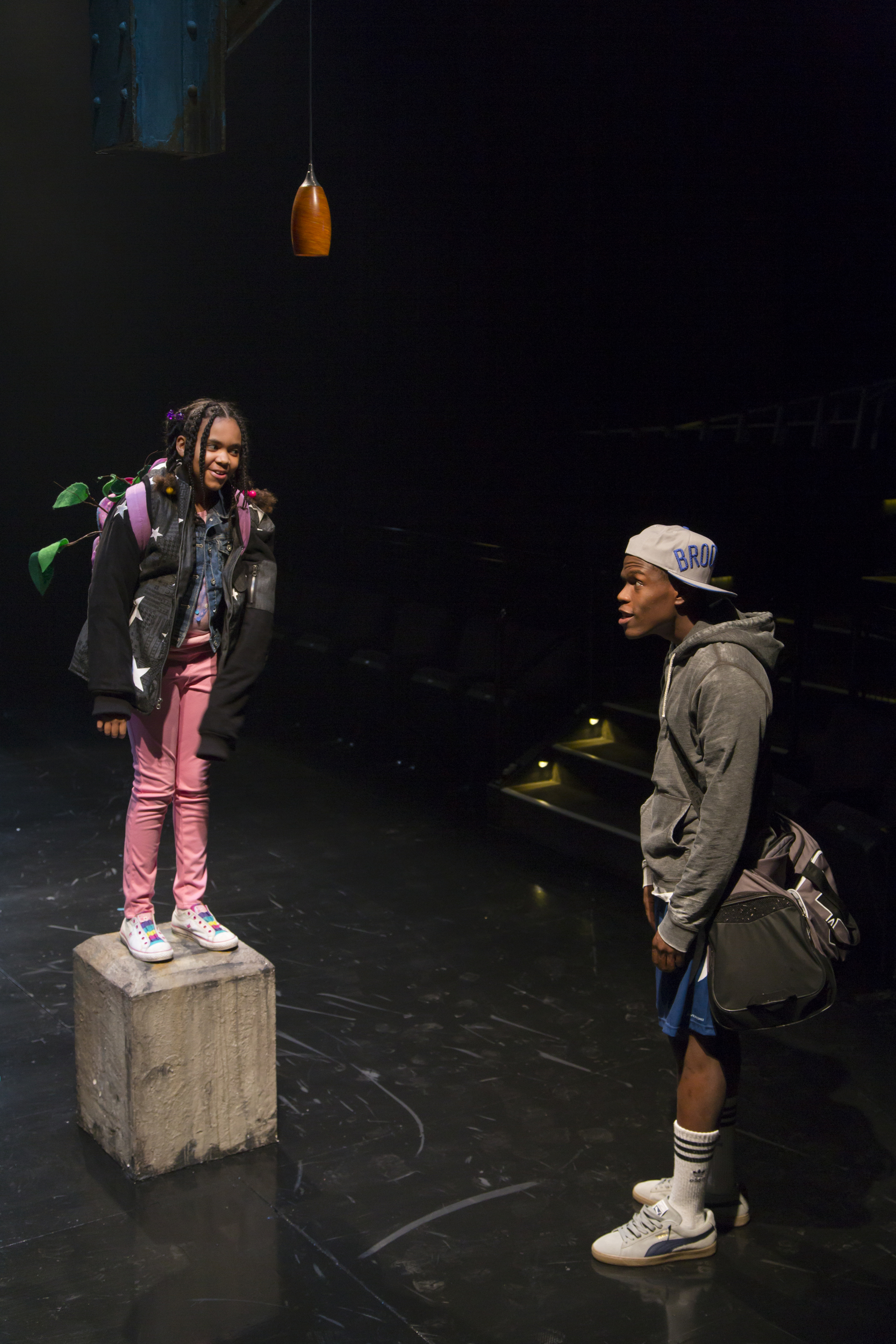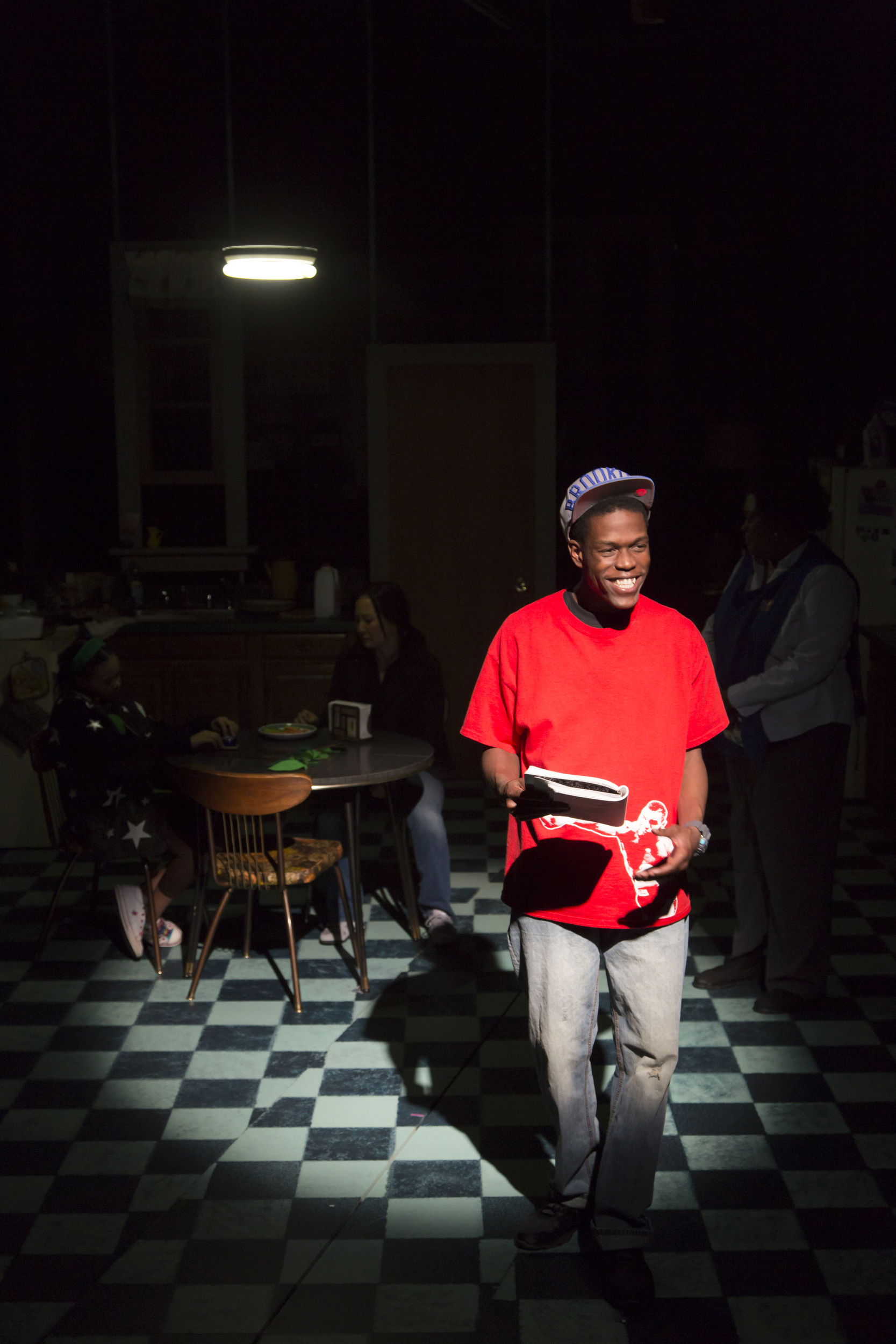Review of Brownsville Song (b-side for Tray) at Long Wharf Theatre
Kimber Lee’s Brownsville Song (b-side for Tray), at the Long Wharf Theatre, directed by Eric Ting, begins and ends with strong speeches that bookend the action of the play. At the outset, Lena (Catrina Ganey), a grandmother, refuses to begin the story—“this doesn’t begin with me,” she insists—while, at the end, Tray (Curtiss Cook Jr.), her grandson, finishes his reading of his college application essay with “this is the beginning.” Between those two speeches, which occur in reverse temporal order, we learn the hopeful and heartbreaking tale of Tray, an enterprising and engaging black boy in Brownsville, an area of Brooklyn known for its high crime rates, who happened to be in the wrong place at the wrong time.
We can infer at once that something bad will happen, since Lena’s speech amounts to a protest against the kind of news stories that note the killing of a young black male as a kind of self-fulfilling prophecy. Lena insists that turning Tray into a statistic does additional violence—to his memory and to the facts of his young life.
The Tray we meet in the story is a dedicated Golden Gloves boxer, a doting older brother, a sassy but loving grandson, a dogged student trying to figure out how to write an application essay that doesn’t sound like everyone else. To that end, his coach enlists a tutor. And that tutor, Merrell (Sung Yun Cho), happens to be an Asian woman who had been married to Tray’s dad and gave birth to Devine (Kaatje Welsh), Tray’s half-sister. Tray’s father was also the victim of street violence and Merrell became a drug addict. Unable to cope with her husband’s death or to care for her daughter, Merrell has lost all ties to the family until now.
The structural problems with the storytelling in Brownsville Song come into play there. Tray’s story, segments of which are acted out for us, are almost a ‘back story’; add to that the back story of Tray’s father and Merrell, and the play sags a bit with the weight of the past and of some events we only hear about. That effect doesn’t harm the story of Tray, his grandmother and half-sister, because the scenes among them are lively and warm, despite the weight of the sad past and the even sadder future we are moving toward as a fait accompli. But in the case of Merrell, that back story feels unearned. She returns to Tray’s life as if desiring and deserving a second chance, but her earlier failures exist only as comments from Tray and his grandmother, and nothing in Merrell’s demeanor bespeaks the kind of life she has, ostensibly, lived. An attempt to make her likeable by showing her barely managing as a Starbucks’ cashier, a job Tray, a Starbucks manager, gives her, lightens things up a bit but doesn’t do much to help the thinness of the character.
Sung Yun Cho’s removed presence is an odd effect when everything else in the play is so vivid. The character of the strict but warm grandma may be a bit of a domestic cliché, but Ganey infuses the role with such vivacity we’re glad to be in her company throughout, including a very touching moment when she concedes that, after all, Tray was a better person that she. As Devine, young Kaatje Welsh shines in her performance of a dance routine that Tray coaxes out of her, and is able to be withdrawn without appearing sulky; we see that her relation with her brother has to do with keeping him focused on what matters—summed up in the simple slogan “hugs not thugs” with which Tray teases his grandma.
The play makes clear the fine line Tray, played with affecting naturalness by Cook, walks between the world he’s trying to hold together for the sake of his own future and his family’s well-being and the world of the streets, which is never without threat. Tray’s buddy, Junior (Anthony Martinez-Briggs) brings those tensions into focus when he tries to account to Lena about what happened to her grandson. It’s a dialogue that feels genuine because the boy wants to assert himself while also sparing the feelings of a woman who knew him as a child. Lena’s tough love toward a self-styled street kid feels very much to the point. The gap between the domestic space of caring and comfort and the unpredictable dangers and pressures of gangland is very real.
Scott Bradley’s set cleverly shows us the kitchen and bedroom of a Brownsville apartment as well as the surrounding streets and alleys, and even a Starbucks, creating an open playing space able to shift time frames as events are recalled and presented. The core of it all is the kitchen table where Lena holds court; in the periphery are the streets where sirens sound and headlights flash, where Tray tries to entertain a dejected Devine, and agrees, warily but sympathetically, to let Merrell back into his life.
The construction of the play is such as to elicit cheers for a young man’s hopes and purpose, even as we know that “the beginning” of which he speaks, in a stirring evaluation of his family and himself, is followed, tragically, by a swift and senseless end. Lee and Ting make us feel the loss but also the positive effects of a life brutally short but never hopeless or pointless. In that sense, Brownsville Song (b-side for Tray) lives up to its intention to pay tribute without flinching from the hard truth at its heart.
Brownsville Song (b-side for Tray)
By Kimber Lee
Directed by Eric Ting
Set Design: Scott Bradley; Costume Design: Toni-Leslie James; Lighting Design: Russell H. Champa; Sound Design: Ryan Rumery; Production Stage Manager: Kathy Snyder; Assistant Stage Manager: Amy Patricia Stern, Theresa Stark
Long Wharf Theatre, March 25-April 19, 2015





